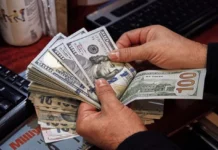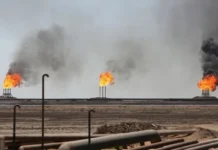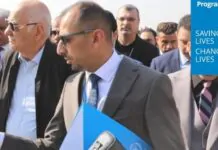Tishwash: Mustafa Hantoush gives his opinion on electronic payment: It has succeeded in Iraq, and here is the evidence.
Mustafa Hantoush, a financial and banking expert, said that the electronic payment experience in Iraq over the past two years has achieved clear success, with advanced indicators in the use of cards and point-of-sale (POS) terminals.
In a statement to Jarida Platform , Hantoush stated, “Previously, we were talking about small, insignificant numbers. Today, the volume of transactions has reached approximately 398 billion dinars per day, with more than 15.15 million electronic payment transactions recorded.”
He added, “The number of point-of-sale devices has increased from 7,000 to more than 75,000, while the number of cards in circulation has jumped from 10 to 12 million to 20 million cards in circulation,” noting that “these numbers reflect a significant shift in the financial market.”
Hantoush emphasized that “Iraq has come a long way in the field of electronic payments, but it still needs to intensify awareness campaigns and enhance citizen confidence to further expand the use of this service.” link
Tishwash: From the communications gateway to the state treasury, the national company is a step on Sudan’s path to an Iraq without oil restrictions.
Former House of Representatives Rapporteur Mohammed Othman Al-Khalidi affirmed, on Sunday (August 31, 2025), that signing the contract to establish the National Mobile Phone Company represents a fundamental pillar in Prime Minister Mohammed Shia Al-Sudani’s strategy aimed at enhancing non-oil revenues and supporting the pillars of the national economy.
Al-Khalidi told Baghdad Today, “About three years ago, Al-Sudani launched an unprecedented national strategy after 2003, aiming to reduce reliance on oil as the main source of the treasury and move towards a diversified economy capable of confronting the fluctuations in oil prices that have burdened Iraq in recent periods.”
He added, “The launch of the National Mobile Phone Company contract, under the auspices of Al-Sudani, will contribute to increasing non-oil revenues by at least 20 to 25 percent over the next three years, in parallel with the government’s steps to reorganize ports and border crossings, implement electronic automation to combat corruption, and ensure revenues reach the state treasury.”
Al-Khalidi pointed out that “opening the door to investment in the telecommunications sector and adopting fourth-generation (4G) technologies will create a competitive environment among companies, contributing to improving the quality of services and lowering their prices, which will have a direct impact on the lives of Iraqi citizens.”
Since 2003, the Iraqi economy has been almost entirely dependent on oil revenues, making it vulnerable to fluctuations in global oil prices and political and financial crises.
With the repeated declines in markets, the need for alternative strategies to boost non-oil revenues and provide the state with stable financial resources has emerged.
About three years ago, Prime Minister Mohammed Shia al-Sudani launched a comprehensive national plan known as the “Economic Diversification Strategy.” This plan included reforms in vital sectors such as ports, border crossings, telecommunications, and banking, while adopting electronic automation as a means to combat corruption and ensure the flow of funds into the state treasury. link
************
Tishwash: Mazhar Saleh: The rise in gold prices in Iraq and the world reflects international economic transformations.
The Prime Minister’s financial advisor, Mazhar Mohammed Salih, confirmed today, Saturday, that gold is a safe haven for those with financial surpluses to preserve wealth, noting that the current rise in gold prices during the current year has reached approximately 37% per gram in Iraq compared to last year.
Saleh told Al Furat News Agency, “This rise reflects the market’s reaction to the uncertain future of foreign currencies, particularly the decline of the dollar against rising local and global gold prices.”
He explained that “globally, with geopolitical tensions and trade wars escalating, investors are turning to gold as a safe haven amid rising international economic risks. He pointed to massive investment flows into gold exchange-traded funds (ETFs), which are witnessing unprecedented levels, in addition to an unprecedented increase in central banks’ demand for gold, with annual purchases approaching 1,000 tons, in an attempt to bolster their reserves and reduce reliance on the dollar, which has contributed to raising global prices.”
Saleh predicted, based on reports from Goldman Sachs, a global financial services company, that the price of gold will reach $3,700 per ounce by the end of 2025, and may exceed $3,880 if the global economic situation deteriorates.
On the local level, Saleh noted that the establishment of the “Gold City” has contributed to stimulating the local market and surprising increases in demand for wholesale gold, which has had a significant impact on local retail prices, especially since Iraq is a net importer of gold.
He added that “the historic rise in gold prices is supported today by a number of global speculative and investment factors, most notably the weak dollar, anticipation of interest rate cuts, geopolitical tensions, and increased central bank gold purchases. Saleh explained that despite the volatility in gold prices, there does not appear to be an imminent bubble burst towards a downside, with prices expected to remain at high levels or gradually rise in the coming months, which could impact prices locally.” link





